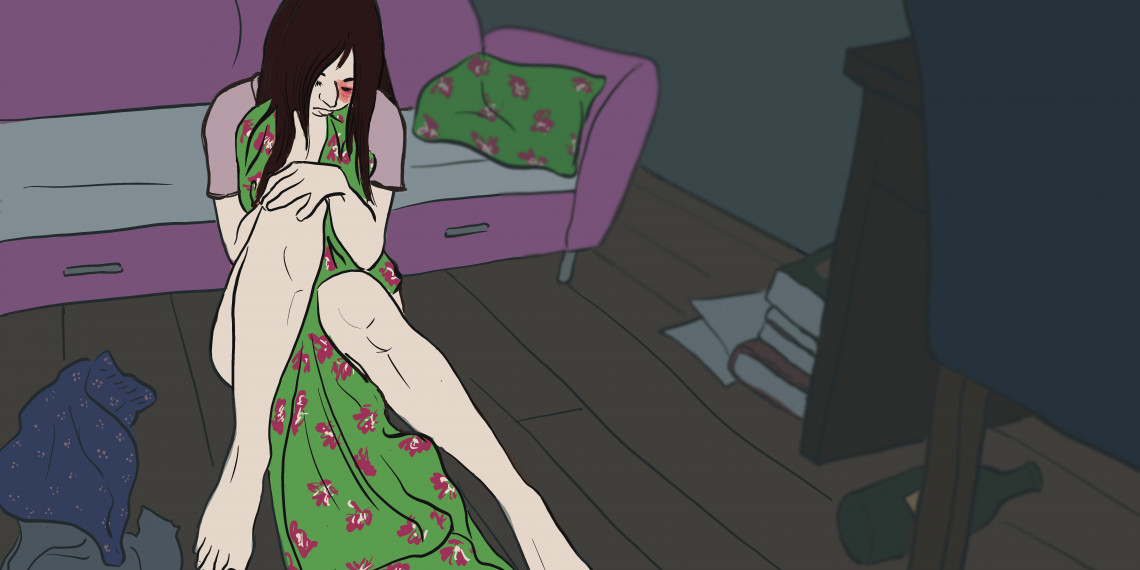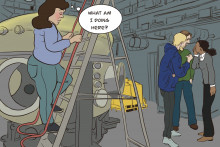Juliëtte’s story: ‘When I smell his perfume, I start to panic’
At the end of 2020, Juliëtte is feeling great. Her studies are on track and everything is going smoothly: 22-year-old Juliëtte feels ready to date. During the major lockdown period caused by the pandemic, she meets a boy on Tinder and they go on a few walks together. In January 2021, after a walk, he invites her to have breakfast at his place. ‘It seemed like a good idea, but once we got inside, he started kissing rather roughly, so I asked him to slow down. He didn’t take that well’, the Dutch student tells us from the coffee corner in the Waaijer building, more than a year later.
‘The blow knocked me out for a moment.’
Spinning
Although the mood is not very pleasant at that point, she decides to have breakfast with him anyway. She is given a glass of orange juice but soon after, she feels her head spin. ‘So I told him I’d better go. I stood up with wobbly legs, and he shoved me hard against the wall. The blow knocked me out for a moment. Then, he threw me on his bed. I regained consciousness fairly quickly, and my mind was hyper alert, but I couldn’t move my muscles. I tried to resist, but then I just let it happen. He was huge compared to me. I knew exactly what was happening but I was helpless to do anything.’
Her date tears some of her clothes and rapes her. Afterwards, he leaves Juliëtte helpless in the street. ‘I walked to the hospital in total shock. My only luck was that he had used a condom. At the hospital I received medical help and underwent a forensic examination. It’s also where the police investigation started (the report was viewed by U-Today, Ed.) and they were able to prove that I’d been drugged via the glass of orange juice. This, and the injuries I had sustained, was sufficient proof for the subdistrict court that I had been raped.’
Trial
The acknowledgement means a lot to her. Nevertheless, she chooses not to initiate criminal proceedings. This choice is in line with a national trend: rape reports very rarely lead to the conviction of the perpetrator. ‘The Public Prosecutor warned me that a criminal case takes years to complete and that you have to go back to court again and again, to testify under oath as a witness. ‘That guy can get hit by a bus for all I care. However, as much as I want to see him brought to justice, I’d also like to have a man sitting next to me on the sofa in a few years’ time. I want to get married, buy a house, and maybe start a family; so I don’t want to have to keep going to court.’
Last October – more than eight months after the rape – Juliëtte is doing a little better. She is back on campus, but then, something terrible happens. She runs into her old Tinder date in the corridor. ‘He’d used a fake name during our dates. Now, I know who he is and what programme he’s enrolled in. I avoid the places he needs to be for his studies as much as possible.’ In addition to the physical and emotional damage she has sustained, Juliëtte also suffers from PTSD (post-traumatic stress disorder). ‘I get completely stressed out over the smallest things. I start to panic when I smell his perfume, or when someone wears a certain type of shirt; I even feel frightened when I see someone with a similar physique as his.’

The fact that the perpetrator is allowed to simply continue his studies at the UT bothers her to no end. However, she feels that there is nothing the UT can do about it. ‘The university is not a court of law, but this is still a major problem for me. I’m a girl in a male-dominated study programme. I don’t even blink an eye anymore when I hear remarks about belonging in the kitchen or that I was made to do laundry. There are so many issues, especially in project groups. I know that students in Sweden and Denmark first have to take a course on social norms. Why don’t we have that here?’
‘I’m a little girl who’s surrounded by men bursting with testosterone’
Confidential adviser
She is relieved that the UT has recently improved the support structure for transgressive behaviour. However, she would have preferred it if the new support structure had already been in place in January 2021. ‘When I told my student adviser what had happened, the only response I got was ‘oh, I’m so sorry.’ They didn’t refer me to anyone and I had to find the right help myself. It took a long time before I came into contact with a confidential adviser who pointed me in the right direction.’
Juliëtte is taking one course at the moment. She simply cannot do any more due to the PTSD she suffers from as a result of the rape. She never sleeps more than four hours a night because of nightmares and flashbacks. She also works on a regular basis, purely for distraction. She had doubts about whether she should tell her story, and whether she should continue her studies. ‘But I feel this moral obligation. If I stop studying and don’t share my story, then who will? When people talk about transgressive behaviour on campus, they often claim that things are not that bad. Stop being so naïve. I’m a little girl who’s surrounded by men bursting with testosterone. There’s often a lack of social control. Things can only change if everyone realises that.’
Ann’s story: ‘I didn’t want to, but I was afraid to say no’
Before she tells us what happened to her, Ann apologises. The 21-year-old feels that she is not really a victim, because she has also heard stories from other female students who fell victim to sexual violence. Still, during the next hour, she tells us that there have been several occasions in the past year when she has had sex even though she did not want to.
About three and a half years ago, Ann moved from Eastern Europe to Twente for her studies. In Enschede, she finds herself in a completely different culture than the closed culture she was used to. From day one, Ann does her best to fit in. She is active and joins several student association boards. ‘But I didn’t really know what my personal boundaries were, because I was still developing as a person. I didn’t know what was socially acceptable and I had difficulty saying no.’
‘I thought it would be over sooner if we’d just have sex’
Without permission
At first, this did not cause any major problems, although she regularly had to deal with situations that made her feel unhappy or uncomfortable. ‘Guy friends would sometimes touch me without permission, thinking it was okay because I was ‘cool’. I pushed it aside, thinking: ‘They’re just men who don’t know how to behave. I never had the courage to say something and it only got worse.’
Because of that fear and doubt about doing the right thing, Ann fell into a depression. ‘When I felt worst, I slept with many different guys. In two cases – on campus – I didn’t even get the chance to say no. I was in bed and he was blocking the door; he grabbed a condom, and I thought it would be over sooner if we’d just have sex. I thought it was a kind of punishment, that it was the only thing I was good for. I didn’t want to, but I was afraid to say no. I felt empty; like I was a piece of meat to any boy around.’
The strict lockdowns during the Covid-19 pandemic came as a blessing to her, as she didn’t have to meet anyone. She visits the student psychologist, but that doesn’t help her very much. Now, Ann is doing much better. She does not blame the UT for what happened to her, but she thinks there are many things that could be improved.
Courses
She points to the Kick-In as the prime example. ‘Hundreds of young, developing people come together for this. They come from all sorts of different cultures, with different customs, social norms and ages. Why doesn’t the UT offer a course on social norms? That way, we all know each other’s healthy boundaries and what is acceptable in professional situations. And students should be involved in this. The Dutch culture is very friendly and I still wonder what I should feel comfortable with. Is it normal if someone slaps my ass because I bend down to pick something up? And that people laugh about it? For many women, this is something they have to endure and experience. We experience transgressive behaviour when it’s too late, men are never taught the lesson that some things are inappropriate.’
‘Victims should report as soon as possible’
The Sexual Assault Centre provides help for victims of sexual violence. How exactly do they help? We asked Anja Ros, case manager of the Sexual Assault Centre Twente-Achterhoek, five questions.
What exactly do you do?
‘Whereas the police focus on ascertaining the truth in cases of sexual violence, we focus on helping the victim. We’ve been doing that for eight years now. Suppose a girl has been raped and she reports it to the police. The police can refer her to us after the report is filed. We can then take her by the hand and see what we can do to support her. We also do watchful waiting. This concerns the victim’s stress and it means that we encourage them to resume their normal activities. After fourteen days, we look at the stress level together and then again after four weeks. At that point, the victim should be doing slightly better, and if that is not the case, we refer them to trauma therapy.’
Are the stories of Juliëtte and Ann recognisable to you?
‘Absolutely, they’re very recognisable. We often help people who have been raped after being drugged, but the other example is also very common: someone doesn’t want to have sex, but is afraid to say no and freezes. We call that “tonic immobility”. In these cases, you often see that the victims blame themselves for not being able to say no.’
What is your first or most important advice to a victim of sexual violence?
‘Report it, as soon as possible. The first seven days after the sexual violence are the most important. The sooner you seek help, the sooner you can begin processing the incident. Confide in someone, a good friend, and let them be the first point of contact and tell, for example, a study counsellor what happened. That’s more beneficial to the process.
Has anything changed for you since the ‘The Voice’ scandal broke?
‘Since the scandal was exposed, many more people have been coming to us with questions. We were busy already, but ever since The Voice, we’ve really had our hands full. People ask us for advice and we’re hearing more stories from people who are not suffering because of a recent, acute incident, but who want to talk about a case from the past. We are there for them too.’
Is there a difference in reports from students and non-students?
‘Not really. People with a higher education sometimes express themselves a bit better verbally, but I want to emphasise that anyone can become a victim of sexual violence. Young and old, male and female. We notice that the people around the victim do not always cooperate, although this is often a subconscious thing. Sometimes, out of sheer emotion, they ask the victim why she was there at that time, or why she had to wear that short skirt. That’s what we call “second rape” or “victim blaming”, and it does not help the victim process the incident.’
Illustrations by: Enith Vlooswijk
People who want to contact the Sexual Assault Centre Twente-Achterhoek can do so by phone via 0800-0188 or via a chat function.







